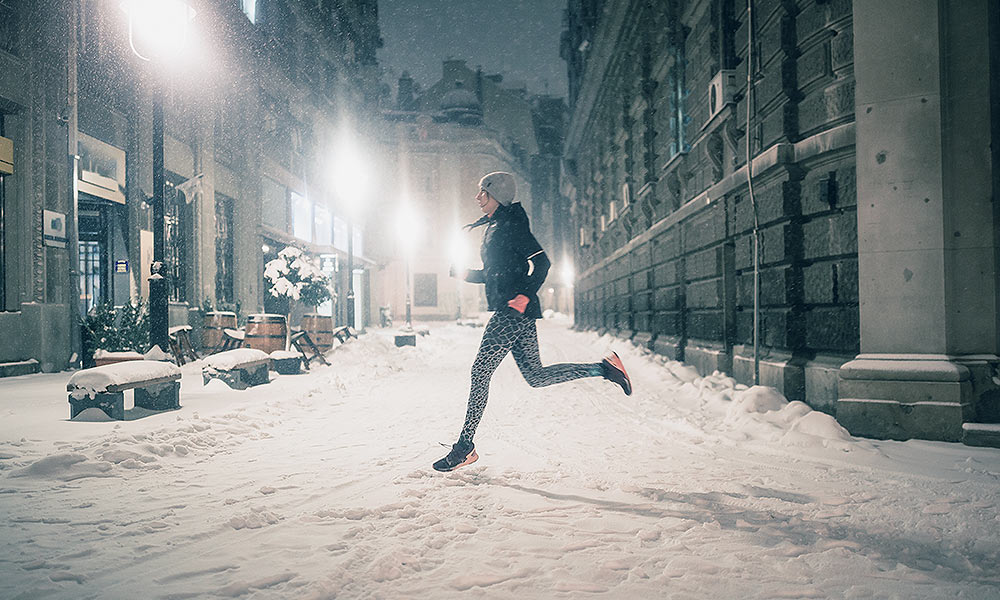Winter is the time of getting bigger — on the front, at the back, everywhere. From nowhere, we gain 3 to 6 extra kilos. Should you bother about it? We believe — not at all. Especially while running with OMY! Sports.
Why so?
Let’s start with the reasons. Doctors identify 2 main causes of weight gain in winter. Lack of vitamin D and too much water.
Lack of sunlight and vitamin D deficiency.
Winter is a time when it’s dark 66% of the day or ~16 hours. At the same time, the number of sunny days is drastically reduced and UVO (ultraviolet irradiation) levels decrease. Ultraviolet rays hitting the human skin activate vitamin D production in the body, which improves metabolism, increases stamina and activity, promotes cell regeneration and rapid recovery. In winter months, against the background of reduced UVO, there is a decrease in the synthesis of vitamin D in the body, which is facilitated by dense coverage of the earth with clouds and the use of warm closed clothing.
Vitamin D is formed in the skin under the influence of UVO or comes with food, then there is a chain of metabolic processes with the formation of active metabolites of vitamin D, which provide regulation of calcium and phosphate metabolism — the so-called classical action of vitamin D.
Without the sun, the formation of vitamin D in the body is significantly slowed down. Its deficiency is especially pronounced in the winter months, which leads to a large number of consequences. Among them, scientists emphasize the following:
- decreased physical endurance, general weakness even with a sufficient amount of sleep;
- poor concentration and headaches;
- mood swings, anxiety or depression;
- frequent colds;
- weight gain;
- sleep disturbance;
- dry skin;
- hair loss, etc.
Low temperatures and water accumulation.
In summer in the northern hemisphere, the ambient temperature is above 20C. In winter, however, it is usually negative. The lower the temperature, the higher your need for warmth. The body does not ask your permission and acts on its own, trying to warm itself in all ways. One of them is to collect more water to protect from hypothermia.
Another reason for water accumulation is a decrease in activity (read above) and sweating, which means a decrease in the need to drink water. In this situation, the body starts to store water “just in case”. This leads to rapid weight gain — water is much heavier than fatty tissues.
How can you check water in your body?
If the rings no longer move freely on your fingers, then there is more water. If you see constrictions on your ankles when you take off your socks, that’s water too. Puffy eyelids are also a sign of extra water in your body.
How to manage weight gain?
Weight gain in winter is inevitable and happens to almost everyone. Fighting it by going on rigid diets or running at dusk is a bad idea. It can lead to a sharp drop in immunity and various diseases. There are still 4 easy to follow recommendations:
- Continue with low-intensity running during daylight hours to elevate synthesis of dopamine and endorphins. We wrote about how to run in winter in the running-that-bites-ass-article.
- Use the time for strength training at the gym and go to the sauna to increase water intake and decrease water level.
- Drink more water normally. At least 2 liters a day.
- When choosing the food try to keep this ratio below 2: (sugar + total carbs - fiber)/(total fat + protein)
This way you can keep weight within 3–4 kg of your summer weight.
Will the weight come off by summer?
If running is gradually becoming your habit, keep training and your weight will return to normal at the end of spring together with the activation of the UVO and the gradual increase in the volume and intensity of your running.
So don’t worry! With OMY! Sports training, you will be able to survive the winter safely, strengthen your muscles, preserve your immunity and approach the summer in perfect shape with a perfect weight.
Your OMY! Sports
